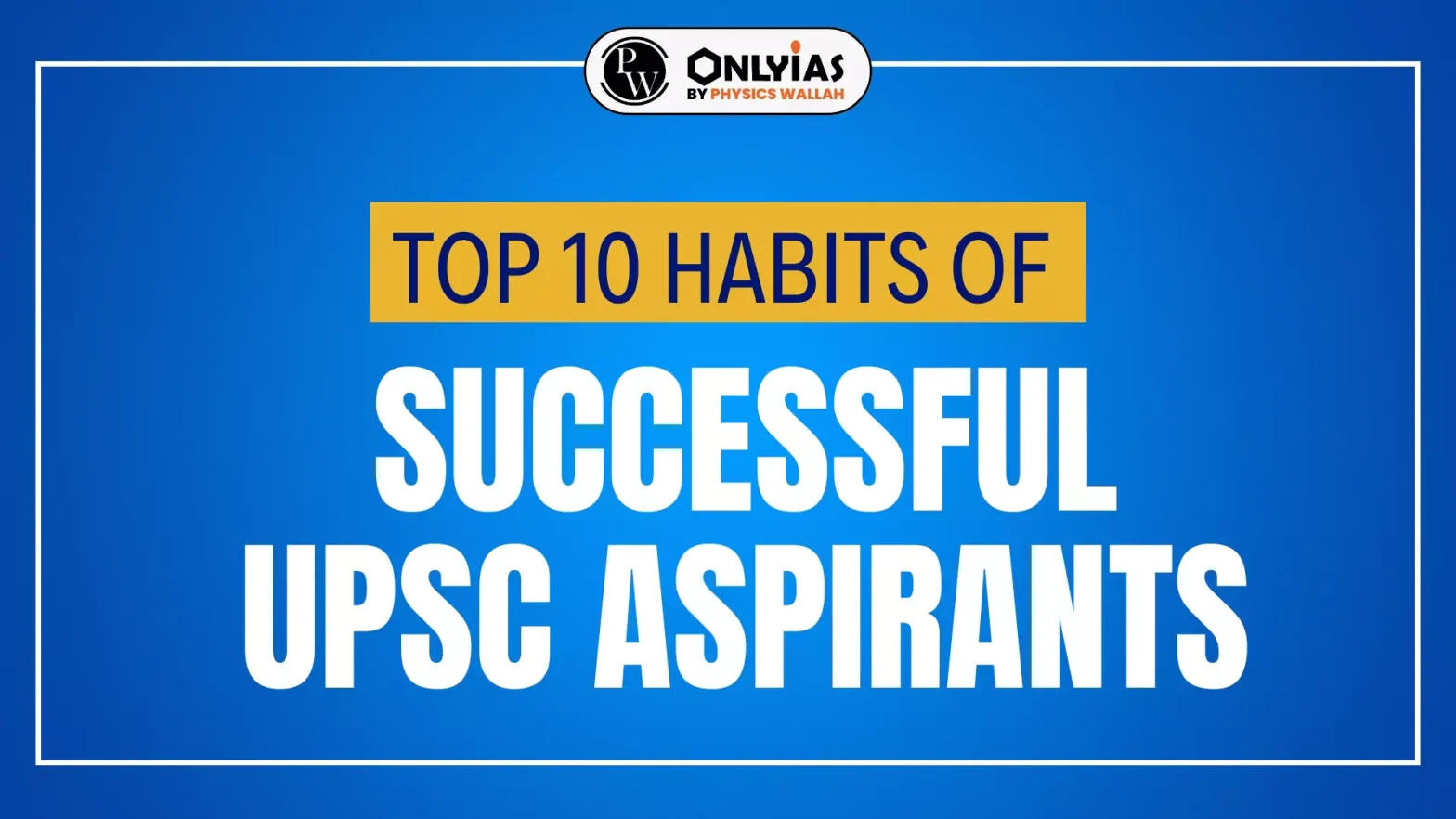Examine the top 10 habits of successful UPSC aspirants to enhance your preparation strategy and optimize your approach for excelling in the Civil Services Examination.

Preparing for the UPSC Civil Services Examination requires more than just book knowledge; it demands discipline, consistency, and the right mindset. Successful UPSC toppers often attribute their success to developing specific habits that helped them stay focused, organized, and motivated throughout their preparation journey. Here, we will explore these habits and provide insights into how you can incorporate them into your daily routine. Additionally, we will discuss how PWOnlyIAS can support you in building these essential habits to achieve success in UPSC.
Becoming a UPSC topper demands more than just hard work and intelligence; it requires a set of disciplined habits and effective strategies. Many aspirants wonder how they can increase their chances of success in one of the world’s toughest exams. Here, we delve into the top habits of successful UPSC aspirants, giving you valuable UPSC success tips and guidance on how to cultivate these habits.
Setting goals is fundamental for any UPSC aspirant as it provides a roadmap for what needs to be achieved. Toppers are known for their well-defined daily, weekly, and monthly goals, which allow them to keep track of their progress and stay aligned with their overall preparation timeline.
| Goal Type | Example |
| Daily Goals | Read 1 newspaper, complete 2 hours of revision |
| Weekly Goals | Finish one full subject or section of study material |
| Monthly Goals | Complete test series, review weak areas, revise notes |
By setting clear targets, you’re able to manage time efficiently and avoid last-minute cramming. Successful aspirants break down their syllabus into manageable parts, ensuring steady progress without burnout.
UPSC demands an extensive amount of reading to cover the vast syllabus, which includes newspapers, magazines, books, and online sources. Toppers consistently read to stay informed about current affairs, socio-political issues, and global events. This habit enhances general knowledge and builds a strong foundation for the main and Interview stages.
To effectively develop a reading habit:
A balanced approach to physical and mental well-being is crucial for sustained performance. Successful aspirants incorporate exercise, meditation, or hobbies to reduce stress and stay focused. Physical fitness helps combat fatigue, while mental well-being boosts focus and resilience during intense preparation phases.
Some practices to consider:
Regular practice and self-evaluation are vital habits for cracking UPSC. Toppers rigorously test themselves with mock exams, practice questions, and timed assignments. This helps them identify weak areas and work on improving them.
Effective time management distinguishes successful aspirants. A proper study plan allocates time for all subjects, ensures adequate revision, and minimizes wasted time. Toppers often use calendars, planners, or apps to track their schedules and stay consistent.
Key strategies include:
UPSC Mains requires not only knowledge but also the ability to write well-structured answers under time constraints. Successful aspirants focus on developing analytical and writing skills by practicing answer-writing daily. This enhances their ability to articulate points clearly and concisely.
UPSC places significant emphasis on current affairs, especially for General Studies. Successful aspirants make it a daily habit to read newspapers, such as The Hindu or Indian Express, and follow credible online resources.
UPSC Study Habit: Dedicate 30-45 minutes each day to current affairs. Maintaining notes will help in quick revisions before the exam.
Discipline plays a crucial role in maintaining consistency and focus. UPSC toppers maintain a disciplined lifestyle that includes regular sleep, exercise, and breaks to avoid burnout.
UPSC Discipline Tip: Balance study with relaxation. Physical and mental well-being directly affect productivity and focus.
Self-assessment is a habit that separates successful aspirants from others. Regularly assessing strengths and weaknesses allows for targeted improvements and efficient study plans.
UPSC Success Tip: Review your mock test performances and focus on weaker areas. Track improvements over time to ensure a balanced preparation.
While self-study is important, successful aspirants know when to seek guidance. Whether it’s from mentors, coaching institutes, or peer study groups, support can provide clarity and motivation.
Guidance Tip: Surround yourself with mentors and friends who encourage you. Joining a reliable coaching institute, like PWOnlyIAS courses, can also provide structured guidance and materials.
PWOnlyIAS provides structured resources and expert guidance to help you build these essential habits. Here’s how PWOnlyIAS supports you in becoming a successful UPSC aspirant:
PWOnlyIAS is committed to providing holistic support for UPSC aspirants, empowering them to develop these success-driving habits effectively.
Sign up for the PWOnlyIAS Online Course by Physics Wallah and start your journey to IAS success today!
UPSC Exam 2025 Related Articles
UPSC Prelims 2025 Exam
UPSC Notification 2025
UPSC Preparation 2025
UPSC Eligibility 2025
UPSC Exam Pattern
UPSC Syllabus
Setting goals helps in managing time efficiently, keeping track of progress, and ensuring consistent study without last-minute stress.
Ideally, spend 1-2 hours daily reading newspapers and current affairs resources, focusing on making short notes for easy revision.
Answer-writing practice is more crucial for Mains; however, for Prelims, focus on MCQ practice. Answer-writing can help build articulation skills early on.
PWOnlyIAS offers dedicated answer-writing sessions, expert feedback, and previous years' questions for structured practice to enhance your answer-writing abilities.
Set small milestones, celebrate achievements, join supportive study groups, and seek guidance from mentors to stay motivated.
<div class="new-fform">
</div>